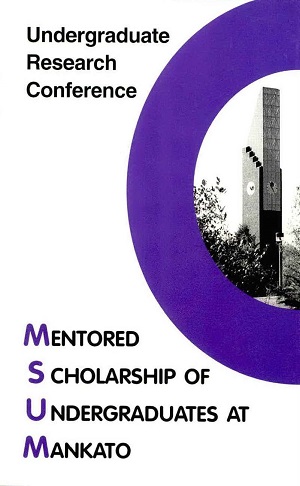Examination of the Thermal Resistance of Enterococcus Faecalis and Escherichia Coll and the Possibility of Heat Resistance Transfer
Location
CSU
Student's Major
Biological Sciences
Student's College
Science, Engineering and Technology
Mentor's Name
Dorothy Wrigley
Mentor's Department
Biological Sciences
Mentor's College
Science, Engineering and Technology
Description
Pasteurization is the use of low heat to kill bacteria in foods. Because bacteria rarely exist as pure cultures in nature, it is feasible that a thermo-tolerant organism might affect the survival of a less thermally tolerant organism, thus limiting the effectiveness of pasteurization. This study examines the effect of heat-resistant Enterococcus faecalis on heat-sensitive Escherichia coli. Preliminary tests determined the appropriate media for counting the surviving organisms in the mixed cultures. Then, the thermal resistance of E.coli and E.faecalis was measured by D-values and compared for single and mixed cultures. When the two bacteria were mixed and heated, no change in D-value was seen for E.coli. However, when the mixture was cultured for 2.5 hours prior to heating, the number of surviving E.coli increased. This leads to the preliminary conclusion that E.faecalis has a positive effect on the survival of E.coli.
Examination of the Thermal Resistance of Enterococcus Faecalis and Escherichia Coll and the Possibility of Heat Resistance Transfer
CSU
Pasteurization is the use of low heat to kill bacteria in foods. Because bacteria rarely exist as pure cultures in nature, it is feasible that a thermo-tolerant organism might affect the survival of a less thermally tolerant organism, thus limiting the effectiveness of pasteurization. This study examines the effect of heat-resistant Enterococcus faecalis on heat-sensitive Escherichia coli. Preliminary tests determined the appropriate media for counting the surviving organisms in the mixed cultures. Then, the thermal resistance of E.coli and E.faecalis was measured by D-values and compared for single and mixed cultures. When the two bacteria were mixed and heated, no change in D-value was seen for E.coli. However, when the mixture was cultured for 2.5 hours prior to heating, the number of surviving E.coli increased. This leads to the preliminary conclusion that E.faecalis has a positive effect on the survival of E.coli.




